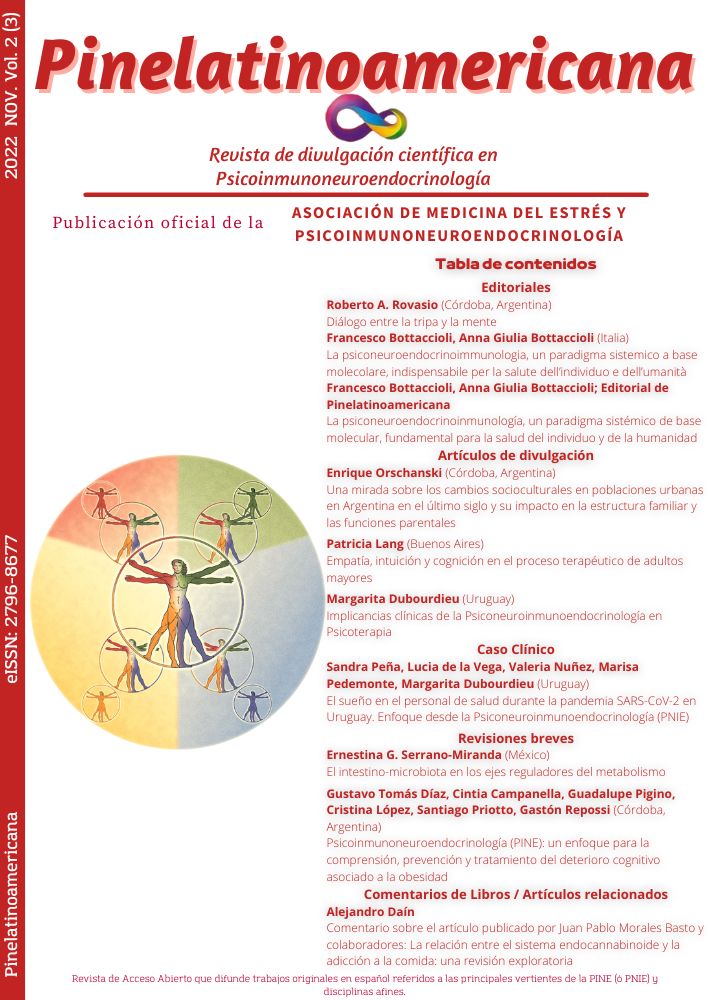Abstract
The changes that occur in individuals during physiological aging are a well-known and experienced reality. However, when assisting the elderly, the intervening parties are usually involved in this situation, without fully considering the expected and unique modifications of each subject.
Empathy, intuition and cognition are three closely related factors, although they present differentiated neuronal circuits in which changes occur throughout life. Knowing the changes that occur over the years will allow establishing adequate communication and better therapeutic bonds. Subsequently, it will be necessary to investigate the way in which each person processes these modifications, giving rise to their own characteristics and the consequent therapeutic approach.
References
Álvarez Merino, P. y Requena, C. (2017). Supremacía de la emoción sobre la cognición en el envejecimiento. International Journal of Developmental and Educational Psychology. https://doi.org/10.17060/ijodaep.2017.n2.v2.1075.
Anton Mlinar, I. (2020). Fenomenología de la cognición social y neurociencia de segunda persona. Investigaciones Fenomenológicas, (17), 19-35. https://doi.org/10.5944/rif.17.2020.29702.
Ballesteros Jiménez, S. (2009). Memoria implícita en el envejecimiento normal y en la enfermedad de Alzheimer: un enfoque desde la neurociencia cognitiva. Revista Española de Geriatría y Gerontología. 44 (5), 235-237. https://doi.org/10.1016/j.regg.2009.04.004
Chahín Pinzón, N., y Briñez, B. L. (2011). El proceso de envejecimiento desde la neurociencia cognitiva. Poiésis. 11 (22). https://doi.org/10.21501/16920945.205.
Cólica, P. R. (2021). Conductas emocionales y estrés. Pinelatinoamericana, 1(1), 12-17. https://revistas.unc.edu.ar/index.php/pinelatam/article/view/36036
Comes-Fayos, J., Romero-Martínez, A., y Moya Albión, L. (2018). Papel de los tractos de fibras largas de asociación en la empatía. Revista neurología 67(7), 263-72. https://doi.org/10.33588/rn.6707.2017468
Díaz, G. T., Campanella, C., Reartes, G. A., López, C., Priotto, S., Wilson, V., Ávila, M. B., Fuente, G. y Repossi, G. (2021). Efectos beneficiosos del programa “Aprendiendo a vivir” sobre la salud psicoafectiva de adultos mayores diabéticos y no diabéticos de Carlos Paz, Córdoba, Argentina en tiempos de pandemia de Covid-19. Pinelatinoamericana, 1 (1), 26-35. https://revistas.unc.edu.ar/index.php/pinelatam/article/view/36135.
Enticott, P. G., Johnston, P. J., Herring, S. E., Hoy, K. E., y Fitzgerald, P. B. (2008). Mirror neuron activation is associated with facial emotion processing. Neuropsychologia, 46 (11), 2851–2854. https://doi.org/10.1016/j.neuropsychologia.2008.04.022
Filippetti, V. A., López, M. B., Richaud, M. C. (2012). Aproximación neuropsicológica al constructo de empatía: Aspectos Cognitivos y Neuroanatómicos. Cuadernos de Neuropsicología. 6 (1), 63-83. https://doi.org/10.7714/cnps/6.1.204
Fuentes Farías, F. J. (2022). Empatía y arquitectura: una propuesta fenomenológica. Hacia una teoría enactivista del diseño urbano arquitectónico. Revista Arquis. 11 (2), 149-164. https://doi.org/10.15517/ra.v11i2.48075
García García, E. (2007). Teoría de la mente y ciencias cognitivas. En Nuevas perspectivas científicas y filosóficas sobre el ser humano. Madrid: Universidad Pontificia Comillas de Madrid, pp. 17-54.
Giménez-Amaya, J. M., y Murillo, J. I. (2007). Mente y cerebro en la neurociencia contemporánea. Una aproximación a su estudio interdisciplinar. Scripta Theologica. 39(2), 607-635. ttps://doi.org/10.15581/006.39.11125
Grandi, F., y Tirapu Ustárroz, J. (2017). Neurociencia cognitiva en el envejecimiento: modelos explicativos. Revista Española de Geriatría y Gerontología. 52(2), 326-331. http://dx.doi.org/10.1016/j.regg.2017.02.005
Lastre Meza, K. S., Guardo Marchán, M. E. y Gutiérrez Meza, Y. (2022). Análisis de correlación entre la audición y la flexibilidad cognitiva en una población adulta mayor de Sincelejo, Colombia. Psicogente 25 (47), 1-23. https://doi.org/10.17081/psico.25.47.4911.
O'Brien, E., Konrath, S. H., Grühn, D., y Hagen, A. L. (2013). Empathic concern and perspective taking: linear and quadratic effects of age across the adult life span. The journals of gerontology. Series B, Psychological sciences and social sciences, 68(2), 168–175. https://doi.org/10.1093/geronb/gbs055.
Ortega, H., Cacho, R., López Goñi, J., y Tirapu-Ustárroz, J. (2014). Empatía y juicios morales en la población anciana. Rev Neurol. 59 (3), 97-105. https://doi.org/10.33588/rn.5903.2014239

This work is licensed under a Creative Commons Attribution-NonCommercial 4.0 International License.
Copyright (c) 2022 Pinelatinoamericana

